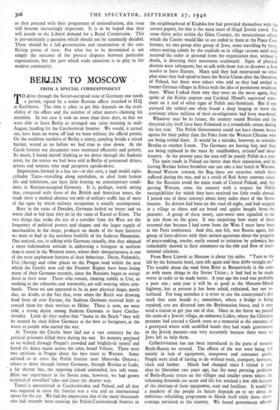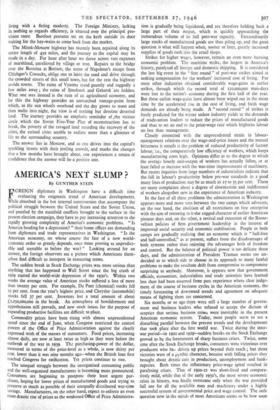• BERLIN TO MOSCOW
FROM A SPECIAL CORRESPONDENT
TO drive through the Soviet-occupied zone of Germany one needs a permit, signed by a senior Russian officer attached to H.Q. at Karlshorst. The time it takes to get this depends on the avail- ability of the officer and the number of other matters claiming his attention. In our case it took no more than three days, so that we were able to leave Berlin as arranged one rainy morning in mid- August, heading for the Czechoslovak frontier. We would, it turned out, have been no worse off had we been without the official permit. On the southern outskirts of Berlin a sentry, standing beside a raised barrier, waved us on before we had time to slow down. At the Czech frontier our documents were examined efficiently and politely. So much, I found myself thinking as we drove through the Sudeten areas, for the stories we had been told in Berlin of protracted delays, arrests and sentries who read passports upside-down.
Impressions formed in a fast car—in this case, a 1946 model eight- cylinder Tatra—travelling along autobahns, so aloof from human life and habitation, can have little bearing on contemporary condi- tions in Russian-occupied Germany. It is, perhaps, worth noting that, compared with those of the British and American zones, the roads show a marked absence not only of military traffic but of most of the signs by which military occupation is usually accompanied.
Busy in the ruins of Dresden, Germans looked no better and no worse clad or fed than they do in the ruins of Kassel or Essen. The two things that strike the eye of a traveller from the West are the frequency of political posters and slogans and the larger supply of merchandise in the shops, products no doubt of the busy factories we were to find in the northern foothills of the Sudeten Mountains. One noticed, too, in talking with Germans casually, that they adopted a more independent attitude in addressing a foreigner in uniform than is usual in the Western zones, where-their obsequiousness is one of the most unpleasant features of their behaviour. Decin, Podmokly, Usti (Aussig) and other places on the Prague road within the area which the Czechs now call the Frontier Region have been losing many of their Germans recently, since the Russians began to accept them in their zone Those who remain, clearing rubble in Usti, or working in the refineries and wireworks, are still wearing white arm- bands. Those we saw appeared to be in poor physical shape, partly due, no doubt, to the fact that, even when the Reich was drawing food from all over Europe, the Sudeten Germans received little to reward them for their services to Hitler. There is now, we were told, a strong desire among Sudeten Germans to leave Czecho- slovakia. Little do they realise that " home in the Reich " they will be treated by their fellow Germans at the best as foreigners, at the worst as people who started the war.
At Terezin the Czechs have laid out a vast cemetery for the political prisoners killed there during the war. Its memory persisted as we walked through Prague's crowded and brightly-lit streets and heard the dance music across the calm, broad Voltava. There were two opinions in Prague about the best route to Warsaw. Some advised us to cross the Polish frontier near Morayska Ostrava ; others to drive through former Germany, through Breslau to Lodz, a far shorter but, the opposing school contended, less safe route. After our experiences in the Soviet zone, however, we had grown sceptical of travellers' tales and chose the shorter way.
Travel is unrestricted in Czechoslovakia and Poland, and all that was required to cross the frontier was a visa and an international :arnet for the car. We had the impression that of •the many thousands who had recently been crossing the Polish-Czechoslovak frontier in
the neighbourhood of Kladsko few had provided themselves with the correct papers, for this is the main route of illegal Jewish travel. For some thirty miles within the Glatz Country, the mountainous salient which the Czechs would like to see ceded to them at the Peace Con- ference, we met group after group of Jews, some travelling by lorry, others waiting calmly by the roadside or in village taverns until they received the order to proceed from the organisation that, without a _doubt, is directing their movement southward. Signs of physical distress were infrequent, but to talk with them was to discover a firm resolve to leave Europe. Many said they had entertained no other plan since they had opted to leave the Soviet Union after the liberation of Poland, but there were others who told us they had settled in former German villages in Silesia with the idea of permanent residence there. When I asked them why they were on the move again, they spoke of the Kielce pogrom and Cardinal Hlond's equivocal state- ment on it and of other signs of Polish anti-Semitism. But if one pursued the subject one often found a deep longing to leave the continent where millions of their co-religionists had been murdered.
Whatever may be its future, the country round Breslau and the shattered city itself have been Polonised to a remarkable extent during the last year. The Polish Government could not have chosen better agents for their policy than the Poles from the Western Ukraine who are being settled there. It would be a mistake, however, to consider Breslau as another Lwow. The Germans are leaving fast, and they are being replaced in the main by smallholders, artisans and shop- keepers. At the present pace the area will be purely Polish in a year.
The main roads in Poland are better than their reputation, and by - leaving Breslau before breakfast one can take a late lunch in Warsaw. Beyond Warsaw towards the Bug there are stretches which have suffered during the war, and as a result of Red Army convoys since. But the Russians avoid the main roads of Central Poland, and, by- passing Warsaw, cross the country with a respect for Polish susceptibilities for which they have received too little credit abroad. I joined one of these convoys about forty miles short of the Soviet frontier. Its drivers had been on the road all night, and had stopped at a village to shave and eat bread and apples bought from the peasants. A group of these weary, care-worn men signalled to me tp join them on the grass. It was surprising how many of them assumed that because I had come from the West I must have been at the Paris conference. And this, one felt, was Russia again, this group of lorry-drivers with their earnest questions about the progress of peace-making, touchy, easily roused to irritation by polemics, but remarkably shrewd in their comments on the ebb and flow of inter- national relations.
From Brest Litovsk to Moscow is about 750 miles. " Turn to the left by the Intourist hotel, turn left again and then driVe straight on." The trouble about the road from Brest to Baranovitchi is the same as with many things in the Soviet Union ; it had had to be made worse in order to be made better. A year ago the road was probably a poor one ; next year it will be as good as the Moscow-Minsk highway, but at present it has been relaid, redrained, but not re- surfaced. For long stretches it is wiser to use the countryman's dirt track that runs beside it ; sometimes, where a bridge is being repaired, you are diverted into the Byelorussian forest, and it may need a tractor to get you out -of that. Once in the forest we passed the ruins of a Jewish village, an unknown Lidice, where the Christian peasants had erected a Greek cross as a memorial at tfie entrance of a graveyard where with unskilled hands they had made gravestones in the Jewish manner—not very accurately because there were no Jews left to help them.
Collectivisation has not been introduced in the parts of western Byelo-Russia we crossed. The effects of the war were being felt mainly in lack of equipment, manpower and consumer goods. People were tired of having to do without tools, transport, kerosene,
'cloth and leather. Minsk had changed since I visited it just after its liberation two years ago, but the most pressing problems of Byelo-Russia centre on the villages and smaller towns where the rehousing demands are acute and life has reached a low ebb because of the shortage of farm equipment, seed and fertiliser. It would be a mockery of the people its future depends on to set about an ambitious rebuilding programme in Minsk itself while these short- comings persisted in the country; We found government officials
living with a fitting modesty. The Foreign Ministry, lacking in nothing as regards efficiency, is situated over the principal pro- vision store. Barefoot peasants sat on the kerb outside its door waiting for the hay-wain to come back from the market.
The Minsk-Moscow highway has recently been repaired along its entire length of 450 miles, and the journey to the capital may be made in a day. For hour after hour we drove across vast expanses of marshland, unrelieved by village or tree. Repairs to the bridge over the Beresina at Borisov, the scene of Napoleon's escape from Chichgov's Cossacks, oblige one to leave the road and drive through the crowded streets of this small town, but for the rest the highway avoids towns. The ruins of Vyasma stand gauntly and raggedly a few miles away ; the ruins of Smolensk and Gzhatsk 'are hidden. What one sees instead is the ruin of an agricultural economy, and for this the highway provides an unmatched vantage-point from which, as the sun wheels overhead and the day grows to noon and then melts into night, the view is of nothing but desolate deserted land. The journey provides an emphatic reminder of ,,the vicious circle which the Soviet Five-Year Plan of reconstruction has to break, the poverty of the ravaged land retarding the recovery of the cities, the ruined cities unable to radiate more than a glimmer of life to the surrounding country.
The answer lies in Moscow, and as one drives into the capital's sparkling 'streets with their jostling crowds, and marks the changes that a few months have brought about, one experiences a return of confidence that the answer will be a positive one.



























 Previous page
Previous page